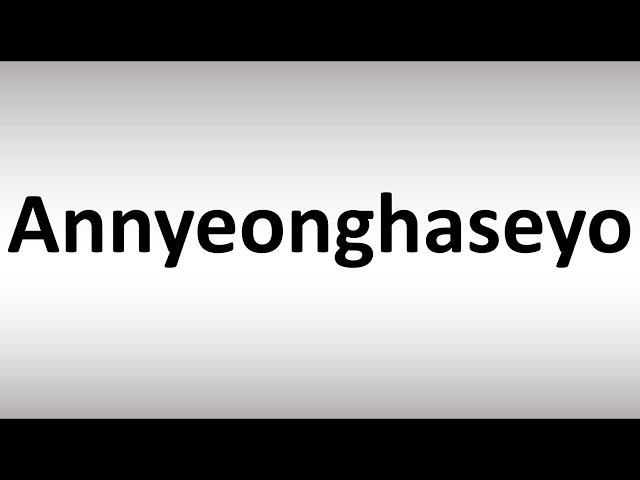Annyeonghaseyo meaning english
English to Korean. Korean to English. Video Build your vocabulary.
Check it out below:. Remember that Korean is a hierarchical language. That means you need to use the proper formality level, or you can come off as offensive for being too casual or too formal to people you know. This lesson is written using both Hangeul the Korean Alphabet and romanized English. This is often used in announcements, speeches, or on the news in South Korea. Note that this formal way to greet someone is actually a question. You may hear it said as a statement or a question.
Annyeonghaseyo meaning english
Korean is a language full of words and expressions that are used to greet others, both formal and informal, starting from expressing hello in Korean. Curious to know what they are? For this meaning, you can often find a question mark following it, or in spoken language it might sound like a question. Although this word is already formal itself, there is also a variant of this, and can be heard on television or during official speeches or in a military environment. On the other hand, there are two ways of saying goodbye and they change depending on what the speaker is going to do. The latter expression is also used when both speakers have to leave. Between friends , the matter becomes much easier because you can use informal language. There is no doubt that greetings in the Korean language also play an important role in the work environment. At the end of the day, when everyone has finished their work and taken their leave , the same verb can be used but in the past tense. Finally, the language used between friends is simpler compared to formal language.
Get Started. What are honorifics? Start with online courses first.
Whether you are going on a short trip to Korea, or you simply want to learn the Korean language, you will have to start somewhere. It can be daunting to figure out where to start but this list will jumpstart your Korean learning with the 5 most important phrases you need to know as a beginner. There are actually two phrases for the formal polite way to say goodbye in Korean, and which one you use depends on the situation. By looking at their literal meanings you may have a better understanding of what situations they are each used in. Talk To Me In Korean is here to help! Learn with our systematic online curriculum, books and ebooks!
Today, KoreanClass is going to introduce you to eighteen Korean greetings, both informal and formal. We hope you get the most from this Korean greetings guide! You can also say Annyeong to people who are younger than you. Remember that this casual greeting cannot be used to greet people of a higher status—such as a teacher or a boss—or to the strangers that you meet everyday. Annyeonghaseyo is a formal Korean greeting used for everyday conversations, and can be used in the majority of situations. This greeting is used to greet any strangers that you meet such as a cashier at the supermarket as well as people who are older than you, such as older family members. A: Annyeonghaseyo, bongtu piryohasimnikka? B: Annyeonghaseyo, aniyo gwaenchanayo. This formal Korean greeting is commonly used in a business setting. Also, people who are serving in the military in Korea use this formal greeting every day, as they must use formal language.
Annyeonghaseyo meaning english
This phrase is used universally across various social settings, making it an indispensable part of your Korean vocabulary. For those who are auditory learners, getting the pronunciation right is crucial. Here are some common variations:. Understanding these nuances is key to effective communication in Korean.
Kushi movie download in hindi
It shows good manners to greet people older than you with the more respectful version of these phrases. Life in Korea. Like most regions of the world, Korean culture has its own set of customs and social norms, and greetings are no exception. Video Learn English. Awesome, thanks for your kind words. Add to cart. Free trial. You would only use informal Korean with people with close friends or those lower than you in social rank. Video Guides. German English to German. Let's explore the specific words you can use to greet superiors, elders, strangers, friends, and even people over the phone.
Because learning a little every day is easy, strengthens your habits and motivation and you improve your Korean over time. Lessons range from culture and holidays to grammar, slang, phrases and more. Click here to check out the Daily Dose of Korean Calendar.
Alejandra De L. If you enjoy Korean culture, continue reading our blog articles , and contact us with questions about living and studying in South Korea. Chinese English to Simplified. Want to show appreciation in Korean style? English usage. German grammar. Please choose what it says in your passport. The formal language, often used with superiors, elders, or strangers, reflects deference and shows respect for hierarchy. Traditional Chinese images. I want to receive updates on Korea.


You have hit the mark. In it something is also idea good, I support.
I am sorry, that has interfered... I understand this question. Is ready to help.
In my opinion you are mistaken. I can prove it. Write to me in PM, we will talk.